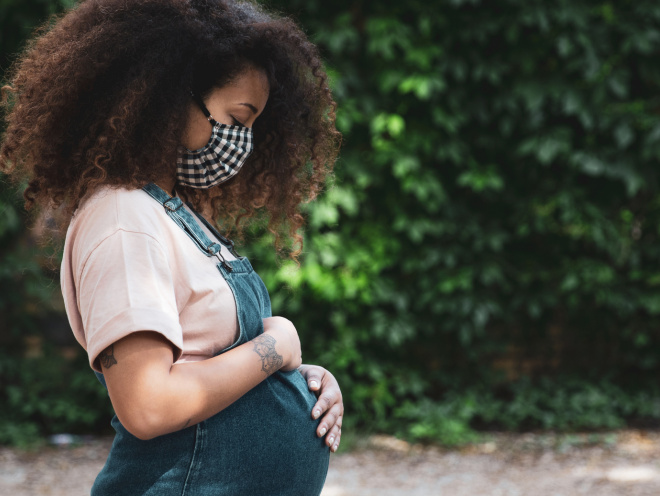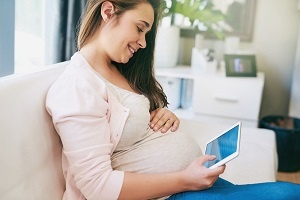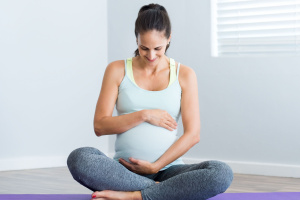If you’re pregnant and worried about coronavirus, read on to learn more about the symptoms and how COVID-19 might affect you during pregnancy.
You’re probably reading lots about coronavirus (COVID-19) and wondering what it means for you and your pregnancy. You might be feeling anxious or perhaps confused by all the information and opinions out there.
As with anything else on your mind, we’re here to make sure you have reliable, accurate information to support you in your decisions and experience.
You might find it useful to watch this NHS video about your care during your pregnancy and labour:
How will coronavirus affect me if I'm pregnant?
Pregnant women don’t usually appear to be more severely unwell if they do develop coronavirus compared to the general public (RCOG, 2020). The majority of pregnant women will experience only mild or moderate cold/flu-like symptoms (RCOG, 2020).
However, some pregnant women may become very ill if they catch Covid-19, especially towards the end of their pregnancy. A small proportion of pregnant women with coronavirus have required admission to hospital for treatment(RCOG, 2020). Sadly, one in 10 women admitted to hospital with Covid-19 need intensive care, which is why the Royal College of Obstetricians & Gynaecologists (RCOG) strongly recommend the Covid-19 vaccination in pregnancy.
The symptoms of coronavirus are:
- A high temperature - you feel hot to touch on your chest or back (you don't need to measure your temperature).
- A new, continuous cough - this means coughing a lot for more than an hour, or three or more coughing episodes in 24 hours.
- A loss or change to your sense of smell or taste - have you noticed you cannot smell or taste anything, or things smell or taste different to normal?
(NHSa, 2020)
During pregnancy, you are more vulnerable to getting infections than a woman who is not pregnant. If you have an underlying condition, such as asthma or diabetes, you may be more unwell if you have coronavirus (RCOG, 2020).
A study by the UK Obstetric Surveillance System (UKOSS), released on 11 May 2020, provided some insights into how coronavrius affected pregnant women. The first report from this study looked at the outcomes of 427 pregnant women admitted to hospital with coronavirus and their babies during the pandemic. Here are the key learnings:
- Most women in the study required only ward treatment and were discharged home well. Around one in 10 women required intensive care.
- The majority of women who did become severely ill were in their third trimester of pregnancy, and it's recommended by the RCOG and Royal College of Midwives (RCM) to get vaccinated during pregnancy.
- Pregnant women from black, Asian and minority ethnic (BAME) backgrounds were more likely than other women to be admitted to hospital for coronavirus.
- Pregnant women over the age of 35, those who were overweight or obese, and those who had pre-existing medical problems, such as high blood pressure and diabetes, were also at higher risk of developing severe illness.
The key message to pregnant women is to contact your midwife or someone in your maternity team if you have any concerns, questions or something doesn't feel right. Please don't worry in silence (RCOG, 2020). Also consider getting vaccinated against Covid-19 if you're pregnant.
Should I get the coronavirus vaccine if I'm pregnant?
The Covid-19 vaccination is safe for you and your baby during pregnancy. There's more information about the vaccine on this Royal College of Midwives (RCM) leaflet and RCOG info sheet.
Hundreds of thousands of pregnant women in the UK and USA have been vaccinated for Covid-19. There haven't been any safety concerns reported following these vaccinations.
Therefore, the JCVI has said that all pregnant women should be offered the Pfizer BioNTech or Moderna vaccines. Anyone who is expecting a baby can make their own decision on the benefits and risks.
Further information can be found on the Royal College of Obstetricians and Gynaecologists website. See our article too, on Can I get the Covid-19 vaccine if I'm pregnant?
Any guidance during pregnancy?
Key advice for pregnant women from RCOG is:
- Get vaccinated as the best way to protect against the known risks of Covid-19 for both you and your baby.
- Keep mobile and hydrated to reduce the risk of blood clots in pregnancy.
- Stay active with regular exercise, a healthy balanced diet, and folic acid and vitamin D supplements to help support a healthy pregnancy.
- Attend all of your pregnancy scans and antenatal appointments unless you’re told not to.
- Contact your maternity team if you have concerns about the wellbeing of yourself or your unborn baby.
(RCOG, 2020/2021)
What about my antenatal appointments?
We all know how important it is for pregnant women to attend antenatal and postnatal care. If you are well, you should attend your antenatal care as normal.
According to guidance from RCM and RCOG, a minimum of six face-to-face antenatal consultations should take place during pregnancy.
If you have symptoms of possible coronavirus infection, you should postpone routine visits until you feel better. Read more about this here.
What happens if my midwife appointments are cancelled?
If your appointment is cancelled or delayed, and you don't know when you'll next be in touch with the maternity team, let them know by using the contact numbers you received at booking (RCOG, 2020).
Can my partner attend my antenatal appointment with me?
In England, the guidance published by the NHS states that pregnant women should have one person beside them "at all stages of her maternity journey." So a partner can attend as long as they're not showing any symptoms of Covid-19 (RCOG, 2020). A partner is also allowed in Wales, Scotland and Northern Ireland.
The latest information for pregnant women states that the guidance is at the discretion of your local Trust or NHS body. So you should check with your maternity unit beforehand to find out their policy on visitors to scans and appointments and on both the antenatal and postnatal wards (RCOG, 2020).
Will it be hard to get support if there's extra strain on hospitals?
If you have any concerns at all, contact your midwife.
I'm due an appointment but what if I can't get through to my doctor’s surgery or midwife team?
If you're due to attend a routine scan, appointment or visit, it's best to contact your maternity unit.
BAME and pregnant?
The UKOSS study in 2020 told us more about how coronavirus affects women and their babies during pregnancy and birth. It revealed a significant and worrying fact that 55% of pregnant women admitted to hospital with coronavirus were from a black, Asian or ethnic minority (BAME) background. Read more about support and information if you're pregnant and BAME here.
Where do I get information about coronavirus and pregnancy?
To make sure you have the most reliable information, refer to the guidelines on coronavirus and pregnancy published by the Royal College of Obstetricians and Gynaecologists, Royal College of Midwives and Royal College of Paediatrics and Child Health.
The guidance includes answers to a range of questions such as:
- Should I get vaccinated against Covid-19?
- What effect will coronavirus have on my baby if I am diagnosed with the infection?
- Will I be able to bring someone with me to my scans?
- What can I do to reduce my risk of catching coronavirus?
- What is the advice for pregnant women with older children attending school/nursery/external childcare?
- What should I do if I think I may have coronavirus or been exposed?
- Can I still attend my antenatal appointments if I feeling unwell?
Take a look at our articles about coronavirus and birth, breastfeeding and using formula, and check the sources in the section below for more information and support.
Page last reviewed: December 2021, amended December 2023
Further information
The NHS website has a specific pregnancy and coronavirus page, which has all the latest information and guidance about support services.
The Royal College of Obstetricians and Gynaecologists, Royal College of Midwives and Royal College of Paediatrics and Child Health have produced information on coronavirus for pregnant women and their families.
The Department of Health and Social Care website is being updated daily with guidance and what the government is doing about the virus.
Our support line offers practical and emotional support with feeding your baby and general enquiries for parents, members and volunteers: 0300 330 0700.
Interactive, engaging and social, our antenatal course is a great way for you to meet other local parents, and get essential unbiased information and knowledge about pregnancy, birth and early days with your baby.
Click on the following links for guidance on self-isolation and social distancing in Arabic, Bengali, Cantonese, French, Gujarati, Mandarin, Polish, Portuguese, Punjabi, Urdu and Welsh.
For more information about coronavirus in various languages see here.
NHSa. (2020) Pregnancy and coronavirus. Available at: https://www.nhs.uk/conditions/coronavirus-covid-19/people-at-higher-risk-from-coronavirus/pregnancy-and-coronavirus/ [accessed 18 May 2020]
NHSb. (2020) Coronavirus (COVID-19). Available at: https://www.nhs.uk/conditions/coronavirus-covid-19/
[accessed 16 March 2020]
Royal College of Obstetricians and Gynaecologists (RCOG). (2020) COVID-19 Virus Infection and Pregnancy. Available at: https://www.rcog.org.uk/en/guidelines-research-services/guidelines/coronavirus-pregnancy/covid-19-virus-infection-and-pregnancy/ [accessed 18 May 2020]
Royal College of Obstetricians and Gynaecologists (RCOG) (2021) COVID-19 vaccines, pregnancy and breastfeeding https://www.rcog.org.uk/en/guidelines-research-services/coronavirus-cov…







